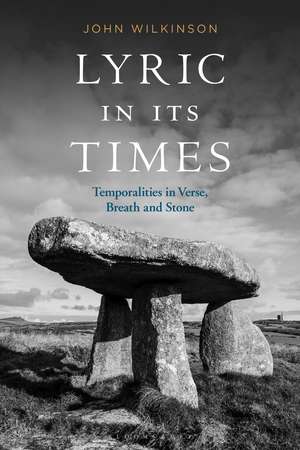Lyric In Its Times: Temporalities in Verse, Breath, and Stone
Autor Professor John Wilkinsonen Limba Engleză Paperback – 23 dec 2020
| Toate formatele și edițiile | Preț | Express |
|---|---|---|
| Paperback (1) | 218.91 lei 6-8 săpt. | |
| Bloomsbury Publishing – 23 dec 2020 | 218.91 lei 6-8 săpt. | |
| Hardback (1) | 658.11 lei 6-8 săpt. | |
| Bloomsbury Publishing – 26 iun 2019 | 658.11 lei 6-8 săpt. |
Preț: 218.91 lei
Preț vechi: 275.55 lei
-21% Nou
Puncte Express: 328
Preț estimativ în valută:
41.89€ • 44.79$ • 34.93£
41.89€ • 44.79$ • 34.93£
Carte tipărită la comandă
Livrare economică 17 aprilie-01 mai
Preluare comenzi: 021 569.72.76
Specificații
ISBN-13: 9781350211551
ISBN-10: 1350211559
Pagini: 296
Ilustrații: 8 bw illus
Dimensiuni: 156 x 234 x 19 mm
Greutate: 0.41 kg
Editura: Bloomsbury Publishing
Colecția Bloomsbury Academic
Locul publicării:London, United Kingdom
ISBN-10: 1350211559
Pagini: 296
Ilustrații: 8 bw illus
Dimensiuni: 156 x 234 x 19 mm
Greutate: 0.41 kg
Editura: Bloomsbury Publishing
Colecția Bloomsbury Academic
Locul publicării:London, United Kingdom
Caracteristici
Includes innovative readings of a wide range of poets, from Shakespeare, Blake and Baudelaire to John Berryman, Frank O'Hara and J.H. Prynne
Notă biografică
John Wilkinson is Professor of English and Director of Creative Writing at the University of Chicago, USA. His previous publications include the poetry collections Reckitt's Blue (2013) and Ghost Nets (2016) and the critical book The Lyric Touch (2007).
Cuprins
List of FiguresAcknowledgmentsChapter 1. Breathtaking PoetryChapter 2. Petrifaction and Wave PowerChapter 3. Anti-Memorial ElegyChapter 4. LapidaryChapter 5. On a Raised BeachChapter 6. Stone ThresholdsChapter 7. Dilapidation and Singing StonesChapter 8. A Shower of NeedlesChapter 9. On the Tip of the TongueChapter 10. Trying TimesNotesBibliographyIndex
Recenzii
[A]stonishingly trenchant and flawless.
Remarkable ... This is a book to marvel at and with, to be inspired by as companionable breath, as tremendous defence of poetry, as manifesto for the rocky three-phase dialectical enactments of art in living language generating the fourth dimension of lyric.
John Wilkinson reads lyric poetry for its "repeatable evanescence," which Wilkinson characterizes as "an experience of life, of beauty time and again, not to be exhausted by one reading of an unambiguous inscription" (11). As a conception of aesthetic experience, "repeatable evanescence" illustrates the inexhaustible ability of lyric poetry to initiate disruptive aesthetic events for readers across various historical moments. Wilkinson understands lyric poems as dynamic object-events that amalgamate a variety of temporalities and other objects. To this end, he develops a style of close reading that combines the analysis of rhythm with attention to poems' material rhetoric of such objects as stone, rock, and glass. So while Wilkinson exceeds the boundaries of treating poetry as a historicist object, resources including visual art, Object-Oriented Ontology, and psychoanalysis allow him to illustrate the complex material life that lyric poetry subsumes as an aesthetic object. Wilkinson's particular interests center on the poetry of mid-twentieth-century New York City and St. Ives, Cornwall, but his readings stretch from the Renaissance to the present and additionally dabble in French and German poetry.
Remarkable ... This is a book to marvel at and with, to be inspired by as companionable breath, as tremendous defence of poetry, as manifesto for the rocky three-phase dialectical enactments of art in living language generating the fourth dimension of lyric.
John Wilkinson reads lyric poetry for its "repeatable evanescence," which Wilkinson characterizes as "an experience of life, of beauty time and again, not to be exhausted by one reading of an unambiguous inscription" (11). As a conception of aesthetic experience, "repeatable evanescence" illustrates the inexhaustible ability of lyric poetry to initiate disruptive aesthetic events for readers across various historical moments. Wilkinson understands lyric poems as dynamic object-events that amalgamate a variety of temporalities and other objects. To this end, he develops a style of close reading that combines the analysis of rhythm with attention to poems' material rhetoric of such objects as stone, rock, and glass. So while Wilkinson exceeds the boundaries of treating poetry as a historicist object, resources including visual art, Object-Oriented Ontology, and psychoanalysis allow him to illustrate the complex material life that lyric poetry subsumes as an aesthetic object. Wilkinson's particular interests center on the poetry of mid-twentieth-century New York City and St. Ives, Cornwall, but his readings stretch from the Renaissance to the present and additionally dabble in French and German poetry.
